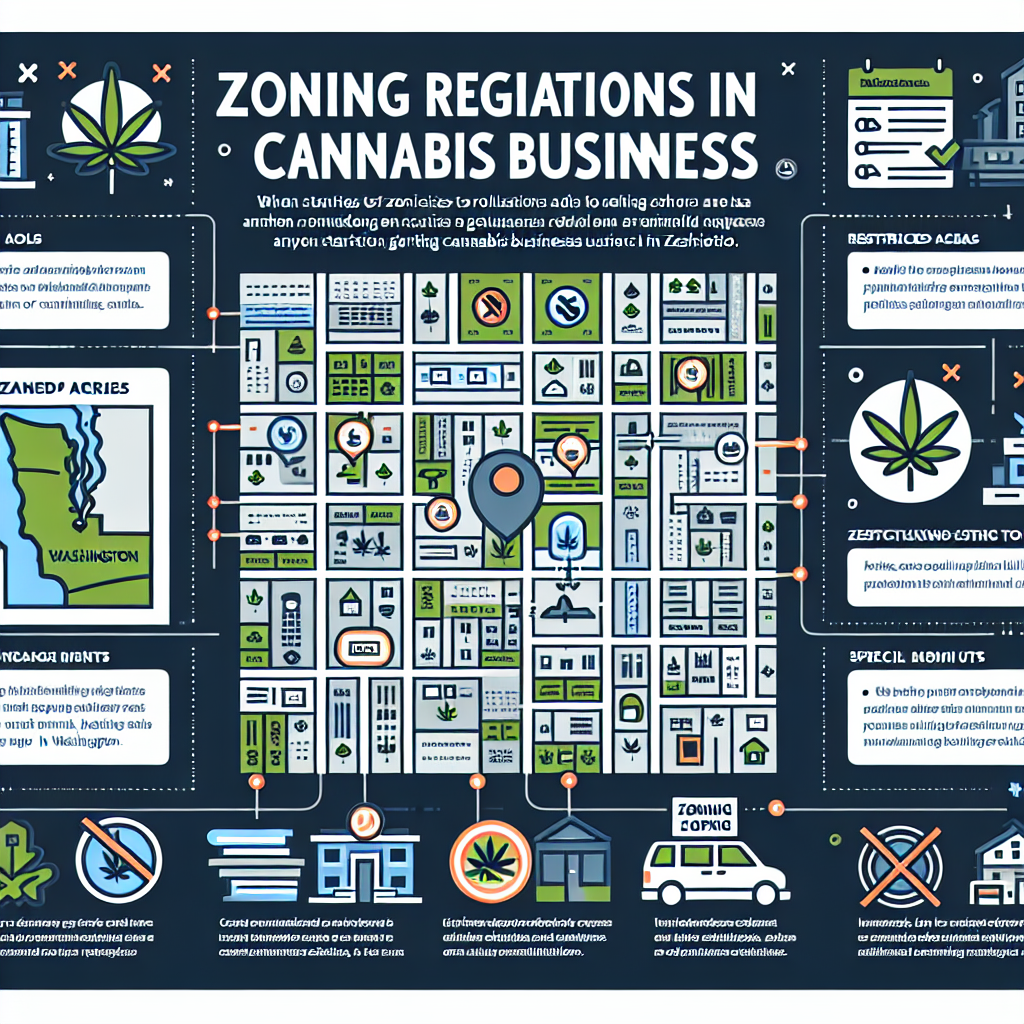If you’re considering starting a cannabis business in Washington, navigating the complex web of zoning regulations can feel overwhelming. Determining which areas are suitable for your business and understanding the various restrictions and requirements can be a daunting task. However, with a clear understanding of the process and some helpful tips, you’ll be able to confidently navigate the zoning regulations for your cannabis business, ensuring a smooth and successful venture in the ever-growing cannabis industry.

Understanding Zoning Regulations in Washington
If you’re considering starting a cannabis business in Washington, it’s important to understand the zoning regulations that apply to your industry. Zoning regulations dictate where certain types of businesses can operate and what activities are permitted in specific areas. By familiarizing yourself with these regulations, you can ensure that your cannabis business is located in the appropriate zone and meets all necessary requirements.
Types of Zoning Regulations in Washington
Washington utilizes several types of zoning regulations to control land use throughout the state. These regulations include residential, commercial, industrial, agricultural, and mixed-use zoning. Each type of zoning designates specific areas for particular purposes. For example, commercial zoning is often required for retail cannabis businesses, while industrial zoning may be necessary for cannabis cultivation facilities.
The Impact of Zoning Regulations on Cannabis Businesses
Zoning regulations have a significant impact on cannabis businesses in Washington. These regulations can determine where a cannabis business can operate, affecting accessibility for customers and visibility for marketing purposes. Additionally, zoning regulations often impose restrictions and limitations on cannabis businesses, such as setback requirements from schools or parks. It is crucial for cannabis entrepreneurs to have a clear understanding of these regulations to ensure compliance and avoid potential legal issues.
Researching Zoning Requirements
Before you can establish a cannabis business in Washington, it is essential to research and understand the specific zoning requirements that apply to your intended location. Here are some steps to help guide you through this process.
Identifying the Local Zoning Authority
The first step in researching zoning requirements is to identify the local zoning authority responsible for the area where you plan to operate your cannabis business. This is typically the city or county planning department. Contact them to determine which zoning regulations apply to your business and request any relevant information or documents.
Obtaining a Copy of the Zoning Code
Once you have identified the local zoning authority, it is crucial to obtain a copy of the zoning code. This document contains all the regulations and guidelines that apply to land use within the jurisdiction. Review the code thoroughly to understand the specific requirements and restrictions that pertain to cannabis businesses.
Reviewing Specific Regulations for Cannabis Businesses
Within the zoning code, there will be sections or provisions specifically addressing cannabis businesses. These regulations may include information on the types of zones where cannabis businesses are allowed, any additional requirements or permits needed, and any restrictions or limitations that apply. Carefully review these sections to ensure you understand how the regulations impact your proposed cannabis business.
Determining Suitable Zones for Cannabis Businesses
Once you have familiarized yourself with the zoning regulations, the next step is to determine which zones are suitable for your cannabis business. Here are some key considerations for this process.
Identifying Zones Where Cannabis Businesses Are Allowed
Within the zoning code, you will find information on the specific zones where cannabis businesses are permitted. These zones may vary depending on the type of cannabis business, such as retail, cultivation, or manufacturing. Identify the appropriate zones in your desired area to ensure your business will be compliant with zoning regulations.
Understanding the Restrictions and Limitations
While certain zones may allow cannabis businesses, there may still be restrictions and limitations that apply. For example, there may be setback requirements, which determine the distance between cannabis businesses and sensitive areas such as schools, parks, or residential areas. Understanding these restrictions is crucial for selecting a suitable location for your cannabis business.
Considering Proximity to Sensitive Areas
When determining the suitability of a location for your cannabis business, it’s important to consider the proximity to sensitive areas. Being near schools or residential neighborhoods may have implications for licensing approval and public perception. Take the time to research and consider the potential impact your business location could have on the community to ensure a smooth operation.
Obtaining Necessary Permits and Licenses
Once you have identified a suitable location for your cannabis business, the next step is to obtain the necessary permits and licenses. The following are some key requirements to consider.
Business License Requirements
In addition to zoning regulations, obtaining a business license is a fundamental requirement for operating a cannabis business in Washington. The specific licensing requirements may vary depending on the nature of your business, such as retail, cultivation, or manufacturing. Contact the appropriate licensing authority to understand the specific requirements and application process.
Specific Permits for Cannabis Businesses
In addition to a general business license, cannabis businesses in Washington may require specific permits. These permits could include a cannabis retailer permit, producer/processor license, or a medical endorsement for medical cannabis businesses. Research the specific permits needed for your type of business and ensure you meet all application requirements.
Obtaining State Licensing
In addition to local permits and licenses, Washington state requires cannabis businesses to obtain a state license. The Washington State Liquor and Cannabis Board (LCB) is responsible for regulating the industry. Contact the LCB to understand the specific licensing requirements and procedures for obtaining a state license for your cannabis business.

Engaging with the Local Community
Building positive relationships with the local community is essential for the success of your cannabis business. Engaging with neighboring businesses and residents can help address concerns, misconceptions, and build support for your operation.
Building Relationships with Neighboring Businesses and Residents
Reach out to neighboring businesses and residents to introduce yourself and your business. This presents an opportunity to foster positive relationships and address any questions or concerns they may have. Building alliances within the community can help create a supportive environment for your cannabis business.
Educating the Public about Cannabis Business Operations
Many people may have misconceptions or negative perceptions about cannabis businesses. Take the initiative to educate the public about the benefits and safety measures associated with your operations. Host informational events, provide resources, and engage in open dialogue to promote understanding and dispel any myths or concerns.
Addressing Concerns and Misconceptions
When engaging with the local community, be prepared to address concerns and misconceptions regarding cannabis businesses. Take the time to listen actively and provide accurate information. Addressing concerns openly and honestly can help alleviate fears and build trust within the community.
Meeting Operational Requirements
Operating a cannabis business in Washington requires compliance with various operational requirements. Here are some key considerations to ensure your business meets all necessary regulations.
Security Measures and Compliance
Cannabis businesses are subject to strict security requirements to deter theft and ensure public safety. These measures may include surveillance systems, alarm systems, secure storage, and access controls. Familiarize yourself with the specific security requirements outlined in the zoning code and state regulations to maintain compliance.
Product Testing and Labelling
Washington has specific requirements for product testing and labeling within the cannabis industry. This ensures consumer safety and provides accurate information about the products. Familiarize yourself with the state regulations regarding lab testing and labeling to ensure compliance and provide consumers with reliable and safe products.
Disposal of Waste Products
Cannabis businesses generate waste products that must be disposed of properly. Washington state has regulations in place to ensure responsible handling and disposal of cannabis waste. Develop a waste management plan that adheres to the state requirements to maintain compliance and minimize environmental impact.

Hiring Professionals for Legal and Compliance Assistance
Navigating the complex world of cannabis regulations can be challenging, so it’s often advisable to seek professional assistance. Here are some professionals who can help you with legal and compliance matters.
Attorneys with Knowledge of Cannabis Regulations
Consulting with an attorney experienced in cannabis regulations can provide valuable guidance throughout the licensing and compliance process. They can help ensure that your business adheres to all legal requirements and navigate any potential legal issues that may arise.
Consulting with Experts in Licensing and Compliance
Consider working with consultants specializing in cannabis licensing and compliance. These professionals have in-depth knowledge of the industry and can assist with navigating the complex regulatory landscape. They can provide guidance on completing applications, meeting compliance standards, and staying up to date with regulatory changes.
Navigating Tax and Financial Obligations
Cannabis businesses face unique tax and financial obligations due to federal restrictions and state regulations. Hiring an accountant or tax professional with experience in the cannabis industry can help ensure accurate financial reporting, tax compliance, and optimization of available deductions.
Understanding the Impact of Federal Regulations
While cannabis is legal at the state level in Washington, it remains illegal under federal law. It’s crucial to understand the impact of federal regulations on your cannabis business.
Federal vs. State Regulations
Federal regulations prohibit the production, sale, and possession of cannabis, regardless of state legalization. This can create challenges and potential risks for cannabis businesses, including banking limitations and potential legal repercussions. It’s important to navigate the intersection of federal and state regulations carefully to comply with both.
Potential Risks and Consequences for Non-compliance
Non-compliance with federal regulations can have severe consequences for cannabis businesses. These consequences may include fines, imprisonment, asset forfeiture, or the loss of licenses and permits. Stay informed about federal regulations and take necessary precautions to mitigate potential risks associated with non-compliance.
Keeping Updated with Federal Changes
Federal cannabis regulations are subject to change, and it’s essential to stay updated with any developments. Monitor legislative updates, consult with professionals, and join industry associations to stay informed about potential changes that may impact your cannabis business.

Addressing Environmental Regulations
Environmental regulations play a vital role in the cannabis industry, ensuring sustainable practices and minimizing ecological impact. Here are some key considerations to address environmental regulations.
Water Usage and Waste Management
Cannabis cultivation requires water, and responsibly managing water usage is crucial for environmental sustainability. Develop practices to minimize water waste, such as using efficient irrigation systems and collecting and reusing water when possible. Additionally, establish proper waste management protocols to prevent contamination and ensure compliance with environmental regulations.
Energy Efficiency and Sustainability Practices
Cannabis businesses consume significant amounts of energy, and prioritizing energy efficiency is essential. Implement energy-saving measures, such as using LED lighting, efficient HVAC systems, and renewable energy sources. Embrace sustainable practices throughout your operations to reduce your carbon footprint and align with environmental regulations.
Complying with Environmental Impact Assessments
Depending on the scale and scope of your cannabis business, you may be required to undergo environmental impact assessments. These assessments evaluate potential impacts on air quality, water resources, and habitat preservation. Comply with any assessment requirements and implement mitigation measures to minimize environmental harm.
Monitoring and Adapting to Evolving Regulations
Regulations within the cannabis industry are continually evolving, and it is essential to monitor and adapt accordingly to remain compliant. Here are some key practices to ensure ongoing compliance.
Regularly Reviewing and Understanding Changes in Regulations
Monitor legislative updates and regulatory changes to stay informed about evolving regulations. Regularly review your compliance procedures and policies to ensure alignment with the most current requirements. This proactive approach will help mitigate compliance risks and maintain a successful cannabis business.
Adapting Business Practices to Stay Compliant
As regulations change, you may need to adapt your business practices to meet new requirements. Stay informed about industry best practices and develop systems that allow for easy adjustability. Regularly assess your operations and make necessary modifications to ensure ongoing compliance with zoning and regulatory requirements.
Seeking Legal Guidance on New Regulations
When faced with new or complex regulations, seeking legal guidance is crucial. Engage with legal professionals experienced in the cannabis industry to help interpret and navigate the changes. Their expertise will ensure that your business remains compliant and avoids any legal issues.
In conclusion, understanding and navigating zoning regulations is vital for successfully establishing and operating a cannabis business in Washington. By thoroughly researching zoning requirements, determining suitable zones, obtaining necessary permits and licenses, engaging with the local community, meeting operational requirements, seeking legal and compliance assistance, understanding federal regulations, addressing environmental regulations, and monitoring and adapting to evolving regulations, you can ensure the compliance and success of your cannabis business in Washington.

